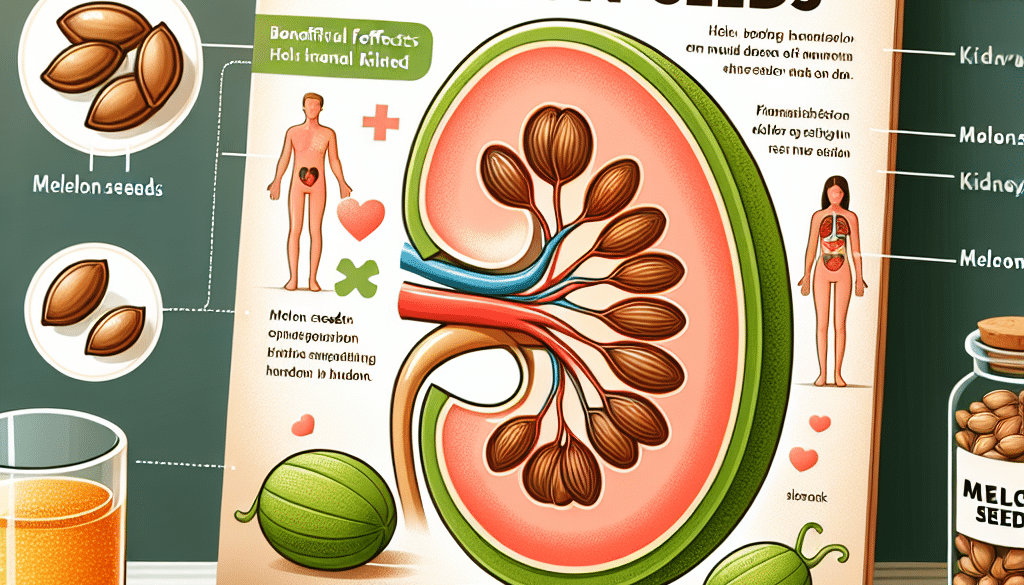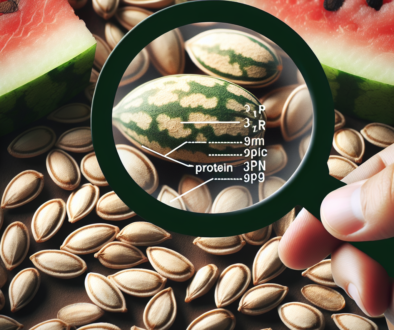Is Melon Seed Good For Kidney?
-
Table of Contents
- Melon Seed Benefits for Kidney Health: A Comprehensive Analysis
- Understanding Kidney Function and Dietary Influences
- Nutritional Profile of Melon Seeds
- Are Melon Seeds Good for Your Kidneys?
- Scientific Research on Melon Seeds and Kidney Health
- Case Studies and Anecdotal Evidence
- How to Include Melon Seeds in Your Diet
- Precautions and Considerations
- Conclusion: Balancing the Benefits with Individual Needs
- Discover ETprotein’s High-Quality Protein Products
Melon Seed Benefits for Kidney Health: A Comprehensive Analysis

Kidney health is a critical aspect of overall well-being, and diet plays a significant role in maintaining it. Among the various foods that are considered beneficial for kidney health, melon seeds have emerged as a topic of interest. This article delves into the potential benefits and considerations of including melon seeds in your diet for kidney health.
Understanding Kidney Function and Dietary Influences
The kidneys are vital organs that filter waste products, excess water, and other impurities from the blood. These waste products are then excreted through urine. Proper kidney function is essential for maintaining the body’s fluid balance, regulating blood pressure, and ensuring that essential nutrients are absorbed while toxins are removed.
Diet can significantly affect kidney health. Certain foods can support kidney function, while others may place additional strain on these organs. It’s important to understand how melon seeds fit into this picture.
Nutritional Profile of Melon Seeds
Melon seeds, such as those from watermelons and cantaloupes, are often overlooked as a nutritional powerhouse. They are rich in various nutrients that can contribute to overall health, including kidney health:
- Protein: Essential for tissue repair and muscle maintenance.
- Magnesium: Helps regulate blood pressure, a key factor in kidney health.
- Antioxidants: Protect the body’s cells, including those in the kidneys, from oxidative stress.
- Zinc: Supports immune function and cellular growth.
- Iron: Necessary for the production of red blood cells.
- Fiber: Aids in digestion and may help prevent constipation, reducing the kidneys’ workload.
Are Melon Seeds Good for Your Kidneys?
Given their nutritional content, melon seeds have several properties that could be beneficial for kidney health:
- The magnesium in melon seeds can help manage blood pressure levels, reducing the risk of kidney disease.
- Antioxidants in melon seeds may reduce inflammation and protect the kidneys from damage.
- The high protein content can be beneficial, but it’s important to consume it in moderation, especially for those with existing kidney conditions.
However, it’s crucial to consider individual dietary needs, especially for those with chronic kidney disease (CKD), as they may need to limit certain nutrients like potassium and phosphorus, which are also present in melon seeds.
Scientific Research on Melon Seeds and Kidney Health
Several studies have explored the effects of melon seeds on kidney health. For instance, research has indicated that the antioxidants found in melon seeds can help reduce the risk of chronic kidney disease and slow its progression. Additionally, the anti-inflammatory properties of these seeds may be beneficial in preventing kidney stones and infections.
However, more research is needed to fully understand the impact of melon seeds on kidney health and to establish specific dietary recommendations.
Case Studies and Anecdotal Evidence
While scientific research is ongoing, there are anecdotal reports and case studies that suggest melon seeds may have a positive effect on kidney health. Some individuals with kidney issues have reported improvements in their condition after incorporating melon seeds into their diet. However, these cases should not be taken as conclusive evidence and should be discussed with a healthcare professional.
How to Include Melon Seeds in Your Diet
Incorporating melon seeds into your diet is relatively simple. They can be eaten raw, roasted, or added to various dishes for a nutritional boost. Here are some ideas:
- Snack on roasted melon seeds as a healthy alternative to processed snacks.
- Add them to salads, yogurts, or oatmeal for added texture and nutrients.
- Use ground melon seeds as a thickener in soups and stews.
It’s important to note that moderation is key, especially for those with kidney conditions who need to monitor their intake of certain nutrients.
Precautions and Considerations
While melon seeds can be a healthy addition to many diets, there are some precautions to consider:
- Individuals with CKD or other kidney-related issues should consult with a healthcare provider before making significant dietary changes.
- Excessive consumption of melon seeds can lead to an overload of certain nutrients, which may be harmful to kidney health.
- It’s essential to balance the intake of melon seeds with other nutrient sources to ensure a well-rounded diet.
Conclusion: Balancing the Benefits with Individual Needs
Melon seeds offer a range of nutrients that can support kidney health, including magnesium, antioxidants, and protein. However, their impact on kidney health can vary depending on individual dietary needs and existing health conditions. It’s important to consume melon seeds in moderation and as part of a balanced diet, and to consult with a healthcare professional if you have concerns about kidney health.
The key takeaways are that melon seeds can be beneficial for kidney health due to their nutrient content, but they should be consumed with consideration of individual health needs and dietary restrictions.
Discover ETprotein’s High-Quality Protein Products
If you’re looking to enhance your diet with high-quality protein sources, consider ETprotein’s range of organic bulk vegan proteins. Their watermelon seed protein is an excellent choice for those seeking to support their kidney health with a plant-based protein option. ETprotein’s products are non-GMO, allergen-free, and characterized by a neutral taste, making them a versatile addition to any diet.
For more information on ETprotein’s offerings and how they can meet your protein needs, contact them at sales(at)ETprotein.com today.
About ETprotein:
ETprotein, a reputable protein and L-(+)-Ergothioneine (EGT) Chinese factory manufacturer and supplier, is renowned for producing, stocking, exporting, and delivering the highest quality organic bulk vegan proteins and L-(+)-Ergothioneine. They include Organic rice protein, clear rice protein, pea protein, clear pea protein, watermelon seed protein, pumpkin seed protein, sunflower seed protein, mung bean protein, peanut protein, and L-(+)-Ergothioneine EGT Pharmaceutical grade, L-(+)-Ergothioneine EGT food grade, L-(+)-Ergothioneine EGT cosmetic grade, L-(+)-Ergothioneine EGT reference grade and L-(+)-Ergothioneine EGT standard. Their offerings, characterized by a neutral taste, non-GMO, allergen-free attributes, with L-(+)-Ergothioneine purity over 98%, 99%, cater to a diverse range of industries. They serve nutraceutical, pharmaceutical, cosmeceutical, veterinary, as well as food and beverage finished product distributors, traders, and manufacturers across Europe, USA, Canada, Australia, Thailand, Japan, Korea, Brazil, and Chile, among others.
ETprotein specialization includes exporting and delivering tailor-made protein powder and finished nutritional supplements. Their extensive product range covers sectors like Food and Beverage, Sports Nutrition, Weight Management, Dietary Supplements, Health and Wellness Products, and Infant Formula, ensuring comprehensive solutions to meet all your protein needs.
As a trusted company by leading global food and beverage brands and Fortune 500 companies, ETprotein reinforces China’s reputation in the global arena. For more information or to sample their products, please contact them and email sales(at)ETprotein.com today.












